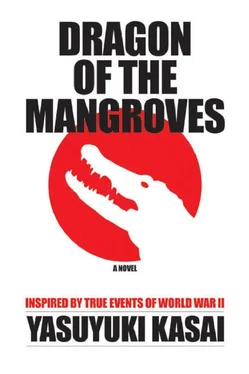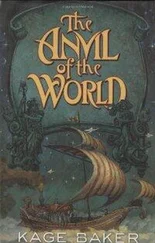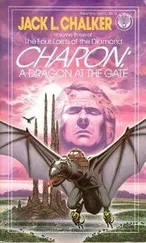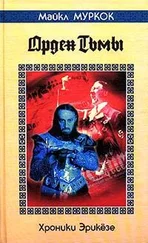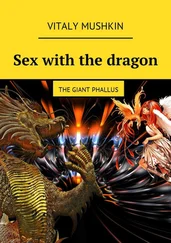“Understood, Lieutenant! If the locals get suspicious and ask me why we stay here, I’ll talk around it,” the cheerful, good-looking Yoshioka replied with an air of confidence.
Sumi decided to leave Manboy behind. He knew he must entrust Manboy to pilot a return sail. He also made the two signalmen concentrate on receiving duties. He judged that their heavy and bulky transmitter-receiver would be quite cumbersome in a mountain trek.
“We all wish you Godspeed,” Yoshioka said.
The remaining four saluted and watched the party of nine, led by Second Lieutenant Sumi, disappear into a dark mountain.
Despite the tropical climate, a night in the mountains was chilly and wrapped in sheer silence, interrupted only by sudden, uncanny birdcalls. The Sumi rescue party was quietly ascending a game trail. It was a forced march, because they had to advance as far as possible by dawn. When they came to a fork, Sumi shone his flashlight at the map. The left trail should lead to the position where some part of Fifth Company had held fast, with their only precious twenty-five PDR field gun, since the end of January.
Shimizu came to him. “What should we do, Lieutenant? Do we go there?”
“No, even if we go now, we’ll find nobody but enemies there,” Sumi answered, and he took the right trail in the fork, closer to Yanthitgyi.
Going through Hill 306, this pass would merge into Payadgi-Ramree Road, connecting Ramree Town, the second largest in the island, and Payadgi Plain.
This road would have been widened by construction of the enemy airfield, since their troops would be using it heavily. Sumi could tell that crossing that road would be one of the operation’s hardest tasks.
The party advanced again.
Sergeant Shimizu and several other crew members had fought in the 1937
China Incident. That battle had led to this long war. In the winter of that year, they all had been fighting hard in North China against Chiang Kai-shek’s Chinese Nationalist Army, while Japanese parallel forces had been slaughtering many civilians in Nanking or Shanghai. The Chinese Army had already been combat-hardened and even equipped with modern cannons, quite ironically imported from Germany, the alliance of Japan. Shimizu and others had gotten beaten up by the Chinese there, so they knew how to move amid enemies. Without Sumi’s order, everyone changed into sandals to avoid having their boots make noisy footsteps.
Sumi and his men couldn’t hear any gunshots. Their own soft treading were the only sounds in the weird tranquility, making them wonder whether any battle had taken place on that island.
When daybreak came near, the soldiers heard clamorous sounds from a clump of trees. Something was crying eerily, and it echoed through the forest. Sumi had no way to tell whether it was a monkey or a bird. Then he noticed a white streak lighting up the lower eastern sky. Shortly, the game trail through Hill 306 went gently downhill to Ramree Plain.
He thought of the physical strength of his crew. They had taken a nap the previous morning, but some of them vomited badly on the way due to fatigue from seasickness and the forced march. Clearly they had to take a rest.
The trail joined a meandering dirt path and continued to descend. After a while, a brook not drawn on the map appeared to their right. It was a tributary of one of the rivers draining into Kalaidaung Creek. Its water was dark and stagnant. A broad marsh spread out everywhere on the right bank, except for thin mud streaks that hemmed the water. Sumi looked around carefully. He could see clearly through the marsh. Even if any enemy should approach, he would be easy to spot. Besides, surrounding trees protected them from being seen from the air.
It was suitable for making a stop. “We’ll make a long halt here. Have a bite and sleep a little, all of you,” ordered Sumi.
Released from the long march at long last, the crew breathed freely again.
They found a dry part of the ground and sat. Immediately, everyone rummaged his haversack and crammed a rice ball into his mouth. However, Pondgi set out walking along the mud bank alone and inspected the ground.
“What’s up, Pondgi? Do you want to crap here? Are you searching like a dog?”
Yoshitake asked.
Everyone giggled. But Pondgi didn’t crack a smile, even a bit. Then he
returned to face Sumi in a determined manner. “Master Sumi. Here is no good.”
“Why?” Sumi asked with a laugh, but he soon became serious. “Why do you think so?”
“Crocodiles are coming,” Pondgi said.
“Crocodiles?” It didn’t make sense to Sumi. He even thought of drawing his Nambu fourteen, fearing that Pondgi was speaking metaphorically of enemies.
“I can’t see any crocs now,” Yoshitake said. “Where on earth are they?”
“In the river. That’s why you can’t see them. But there are many traces of them around. They must have used this spot for sunbathing.”
Pondgi approached the edge, still timidly, and pointed down. Sure enough, there was a strange print etched in a strip on the mud. Its width was well over one meter, and the surface was churned up. It looked like a huge serpent had wriggled about in the mud. The center part was depressed deeply, which told of the incredible weight of its creator. Observing the area carefully, they spotted more traces of the same kind.
Subtle unrest spread among the soldiers.
“A lizard-like animal at the most. Nothing much at all. We all are in Army!
Why should we fear it?” Shimizu suddenly blustered.
Then Yoshitake followed him. “That’s right! Does it shoot at us with an automatic rifle? Can it use those damned Hurricanes or tanks and attack us like Engli bastards do? We have guns!”
A superior private named Morioka then cut in. Morioka was a talkative fellow who had been a primary school teacher. “A Burmese croc is a saltwater crocodile, I think,” he said. “Burmese and African Nile crocodiles are fierce and known as man-eaters. A big one reportedly reaches seven meters in length and one ton in weight. If that kind pounces on us, guns are useless. There will be no hope to survive.”
Pondgi followed him. “Yes, Master Morioka is right. The crocs are hiding out and waiting for us all in this very water! This is a croc’s lair. Very dangerous.
They are watching us from somewhere we can’t see them, because we are in great numbers. But if somebody goes near the water alone, they’ll certainly catch and devour him.”
Nobody had anything more to say after that.
Sumi had read about crocodiles in some book on the ancient civilization of Egypt. He could remember the paragraph well.
“In the Old Kingdom, Sebek, the crocodile-headed deity, was a god who governed the night and the darkness and often beckoned the ruling pharaohs to the underworld. Sebek was broadly worshipped throughout ancient Egypt and was believed to have powers of reviving the sight and senses of the dead. People took crocodiles as his vassals there, handled them gently, and even adorned them with gold ornaments sometimes. When one of these special crocodiles died, people mummified it elaborately and placed it in a decent coffin.”
The book stated that Sebek and Horace, the god of war, were buried in a temple constructed in a place named Kom Ombo, in the suburbs of Aswan, Upper Egypt, and visitors could observe various mummies of deified crocodiles there.
But, sadly, that was all Sumi knew about crocodiles. He had never seen one.
“Well, men. Don’t go near to the water’s edge. Come on back here. Is it all right, Pondgi?” Sumi urged the soldiers to pay attention and gathered them near the road. He let them sit beside the path, after one of them stood sentinel to keep an eye over the area.
“Have a break here. Anyway, we know nothing about crocodiles. Tell us about them, Pondgi,” Sumi said while he distributed the cigarettes given to him by Colonel Nagashima to everybody.
Читать дальше
